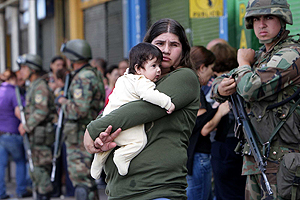
The military suggested to decree state of catastrophe on Saturday -the day the quake struck, but the government took the decision only on Sunday afternoon.
Héctor Yáñez, El Mercurio.SANTIAGO.-Given the scale of the earthquake that has ravaged the country and the extent of the areas affected, the response by Chile’s public services was not expected to be perfect.
However, the very serious flaws evident in the communications systems; the lack of coordination between civil and military authorities, and the delays in helping devastated areas should not to be accepted. These circumstances point towards a State inadequately capacitated and prepared to face this type of catastrophe, something that requires profound change as such disasters are part of our history.
The problem worsens because Chile, being overly centralized as it is, requires a State to respond with efficiency and agility in these situations. The 2007 earthquake in Tocopilla, far more limited than the recent one, revealed deep flaws in the State's ability to react to such tragedies. However, more than two years later, it is clear that nothing was learned from that experience, and that many of the announcements made in 2007 concerning the improvement of the country’s response when facing these situations have not materialized.
These events have uncovered the enormous deficiencies in the State’s machinery, often veiled by imperfect international indicators that assess Chile satisfactorily. While there are stable areas -particularly those directly or indirectly related to economic progress-, most work with standards in management, leadership and priorities that do not meet the standards of a modern State.
Of course, if State institutions are unable to learn and enforce their own recommendations from past experiences, they will hardly be able to foresee the main problems that occur in unexpected situations and act accordingly. With all that has happened this week in Chile, it is hard to believe that its State, to this day, lacks an effective communications system between its main civil and military authorities of both central and regional governments.
It is incomprehensible that no clear protocols exist to automatically activate a series of actions, and that there are so many meetings to coordinate what needs doing. It is unacceptable that there are no contingency plans for help to arrive —within 48 hours— to the areas most affected by a phenomenon of such characteristics. Furthermore, it is hard to understand how the emergency office (Onemi) has committed errors on issues as basic as reporting the number of deaths in the VII region. To understand the magnitude of the shortcomings of Chile’s system, one just need imagine the consequences of all these factors if, instead of a natural disaster, this had been a foreign military attack.
These failures not only derive from unsuitable personnel or methods: in fact, they reflect an institutional framework that requires profound changes in many areas, such as the way we select and evaluate State actors, to the way the State is organized, with its diluted responsibilities and poor control of those who run the various public offices. For instance: How can citizens know the tasks assigned to each public office? What problems do they seek to resolve? To what degree are these tasks addressed? What costs do they imply to the national treasury? What evaluations do we have for strategic plans and performances for heads of each unit?
The challenges in these fields are numerous and changing, and that is why, in affluent countries, the State’s reform agenda is a permanent and continuous task that requires one specific powerful agency.
Chile, however, is still in the early stages of sporadic reforms that materialize only when a problem becomes so untenable that an institutional change is inevitable. These recent events demand that a permanent reform agenda by the State be addressed.